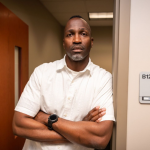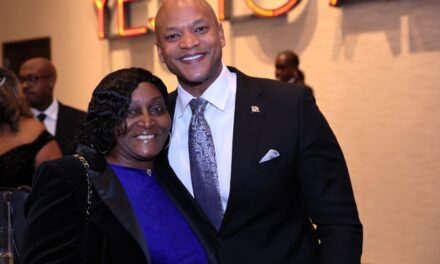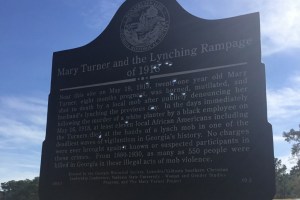By Ryan Michaels
The Birmingham Times
Grief is a “natural reaction” to loss, said Reggie Parker Sr., the city of Hoover’s behavioral health coordinator and a licensed professional counselor in Shelby County, but one that is difficult understand by those experiencing it, he said.
“The theme of grief is [that] it varies from one person to another. It’s strong, and it’s overwhelming, when we feel it in our bodies. It’s a natural reaction, but we don’t know what to do with it, and partially, we struggle with it because of the lack of acknowledging and understanding our emotions,” Parker said.
Grief has been prevalent in the Magic City. Homicides in Birmingham have escalated over the past several years, with 144 recorded last year, the most since 1991.
Many who experience grief struggle with the process because their social learning often conflicts with how grief naturally makes people feel.
“Growing up, a lot of times, we’ve been told that it’s okay to be angry and frustrated, but it’s not okay to be hurt. We also have been told, don’t deal with your emotions because they get in the way of what you should be doing, so when we show our emotions … we don’t want people to perceive us as being weak,” Parker said.
Though that fear of appearing weak often limits people’s emotional range, Parker said, it’s also important that while being more emotional, people learn to handle those emotions.
“That’s how we’re wired. We are emotional beings, and when we’re emotional, that’s the driver of what we do, our behaviors, our choices, decisions that we make, but we’ve got to learn how to deal with those emotions effectively,” Parker said.
Barriers
Societal and cultural norms keep a lot of people out of therapy. Growing us a Black male, Parker said he didn’t know anything about how therapy could assist in life and emotional problems.
Other barriers have included lack of knowledge of the resources available, as well as finding a counselor who fits.
Some counselors may not understand angles for a client, so Parker said he and others are continuously looking for ways to educate people because of how society has labeled people who search out and seek mental health, that something’s wrong with them, that they’re weak, and that they can’t navigate life like others, so we have to educate because…knowledge is power,” Parker said.
“And once we educate people and make it more of a norm, I think the doors will swing open wider than they already are,” Parker said.
Parker urged friends, family and neighbors to simply “be present” with their loved ones experiencing grief.
“[Grieving people] just need you to be there and know that you care, and when they are ready to talk, one of the main things we need to do is listen and let them express themselves,” Parker said.
‘Lashing Out’
Going through grief, people often “lash out” because they simply aren’t aware of the process and the order in which the stages of grief—denial, anger, bargaining, depression and acceptance—occurs, Parker said.
“[The grieving process needs] to be taught and understood, and I think it give us a way of shaping up what’s going on and give us an avenue to be able to work and walk through that dark time of what grief is,” Parker said.
Parker, who has been a licensed counselor since 2011, was formerly a crisis negotiator with Hoover Police Department for 20 years. His previous experience has given him insight on how people react when they don’t know how to express other emotions, he said.
“Granular” Understanding
Many people lack a “granular” understanding of emotional language, Parker said.
“It’s being more granular, being more specific, more intentional with your words, but what we’ll do is we’ll make blanket statements because we haven’t been taught how to be more specific,” Parker said.
“What happens sometimes is when we feel stuck, and there’s no way out, the emotion that most people have readily available to them is anger because we don’t know how to express the other ones because nobody has taught us,” Parker said.
While friends and other loved ones can often form the basis of a support group for when someone close dies, it can weaken the support group when grief descends upon everybody, he said.
“We don’t have, sometimes, the network to help us work through it because nobody’s dealing with the emotions effectively…a lot of people struggle with helping others because they don’t know how to deal with grief themselves,” Parker said.
Seeking out trained professional help is crucial, Parker said.
“We don’t move on from grief, but we move through it, I think that’s very important for people to understand. We move forward, and sometimes people who are not trained in this area, they want us to get better because it makes them feel more comfortable,” Parker said.
Parker’s office can be reached at (205) 739-7448.
Resources for families who have lost loved ones
List of mental health resources in the city.
AMELIA CENTER
The Amelia Center provides grief counseling for children ages 5-21 and parents who have lost children of any age. They provide in-person counseling by appointment only.
1513 Fourth Avenue South
(205) 638-7481
https://www.childrensal.org/amelia-center
BIRMINGHAM POLICE DEPARTMENT’S CHAPLAIN SERVICES
BPD Chaplains can provide grief counseling. Each precinct has a community service officer to assist with mental health services.
205-933-4175
BRIARWOOD PRESBYTERIAN CHURCH
At Briarwood, individuals can seek one-on-one grief counseling for adults or children, group counseling or grief share.
2200 Briarwood Way
(205) 776-5227
BROOKWOOD BAPTIST HEALTH
Brookwood Baptist provides a number of psychiatric services, including treatment for depression and anxiety disorder, as well as trauma.
(877) 909-4233
https://www.brookwoodbaptisthealth.com/services/psychiatry
BROTHER LET’S TALK
BLT provides monthly discussion of mental health topics with area psychiatrists, psychologists and other mental health professionals, particularly for adult men of color.
400 Century Park South Suite 106
https://brotherletstalk.com
COMMUNITY CARE DEVELOPMENT NETWORK
CCDN provides a number of mentoring services and can also connect individuals with other organizations or providers of mental health care.
1920 Old Springville Rd
Center Point, AL 35215
(205) 238-5506
buildourcommunitywithcare@gmail.com
https://www.ccommunitycaredn.org
COMMUNITY GRIEF SUPPORT
Community Grief Support provides free in-person or virtual grief counseling and offers group and individual sessions. Their services are for individuals aged 19 and up, as well as 18-year-olds with parental permission.
1119 Oxmoor Rd. Homewood, Al 35209
(205) 870-8667
THE CRISIS CENTER
The Crisis Center offers 24/7 phone counseling for grief, suicide and other mental health crises, with a special talk line for teenagers.
3600 Eighth Avenue South Suite 501
(205) 323-7777
EASTSIDE MENTAL HEALTH CENTER
The center provides numerous mental health services for children. Adult services are only for individuals with severe mental health disorders.
(205) 836-7283
FAITH PRESBYTERIAN CHURCH
Faith Presbyterian Church offers virtual grief counseling for individuals 18 and up. There is a fee of about $15 to $20, with scholarships available.
4601 Valleydale Rd.
(205) 908-6529
GATEWAY
Gateway provides a variety of mental health and other services with sliding scale payments.
1401 20th Street South
(205) 510-2600
GREATER SHILOH MISSIONARY BAPTIST CHURCH
The church’s grief ministry meets periodically, based on need.
2135 Jefferson Ave. SW
(205)-925-9752
MEADOW BROOK BAPTIST CHURCH
The church provides free in-person grief share which is open to people of all ages.
4984 Meadow Brook Road
(205) 991-8384
SIXTH AVENUE BAPTIST CHURCH
They offer a grief ministry. Send emails to jeppenger@sixthavebaptist.org to secure the Zoom meeting code and password for meeting.
1100 Martin Luther King Dr.
NATIONAL SUICIDE PREVENTION LIFELINE
1-800-273-8255
www.afsp.org











